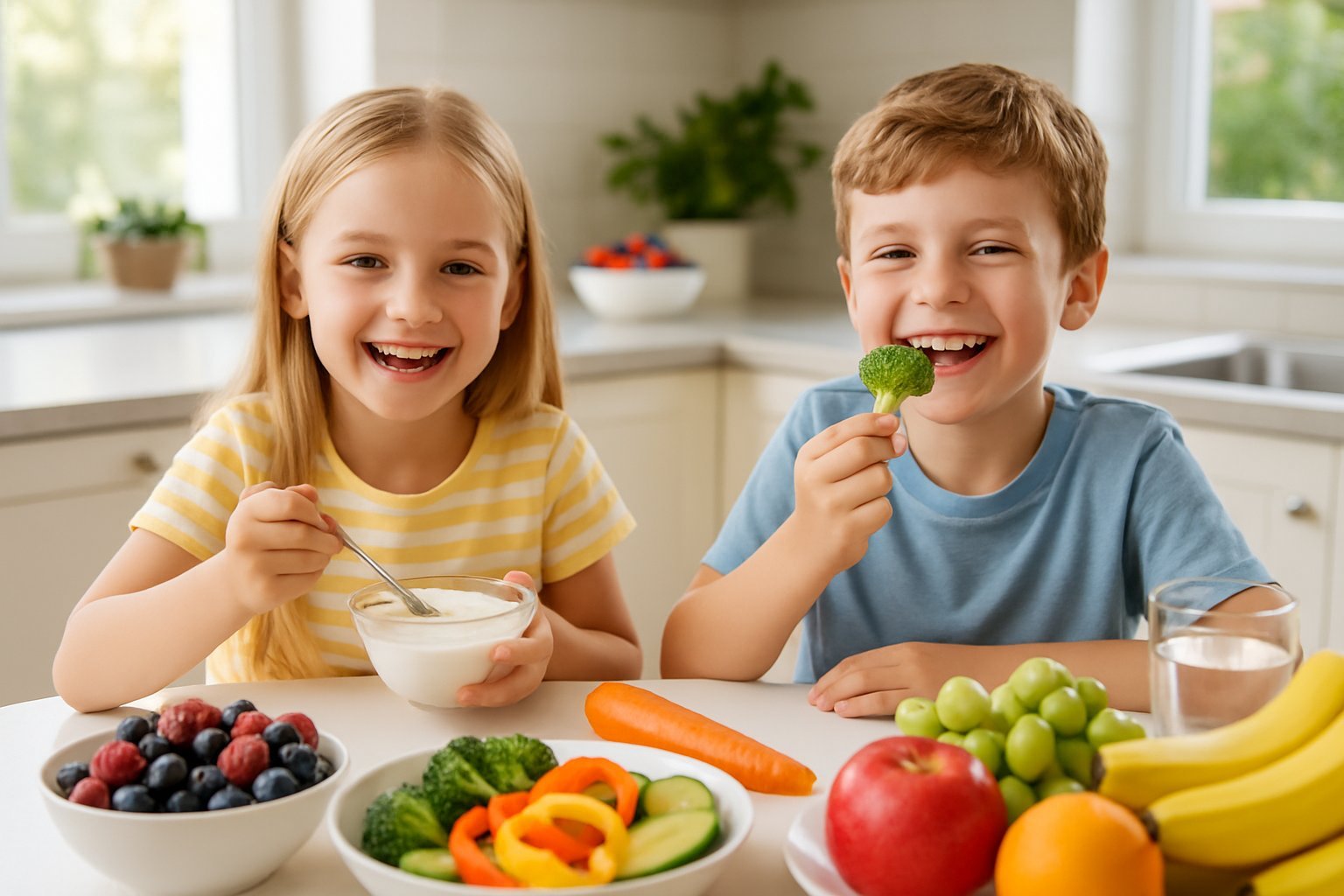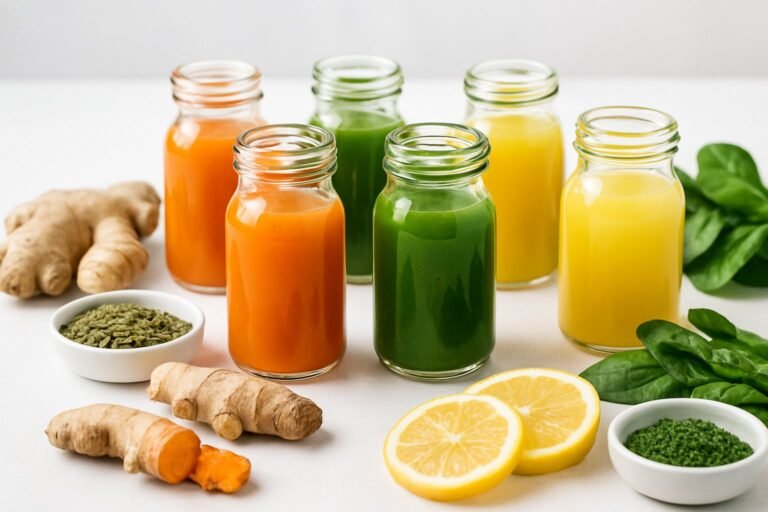Gut Health Kids: The Ultimate Guide to Happy Tummies (with recipes)
When it comes to kids’ health, gut health plays a huge role in how well they grow and feel every day. A healthy gut helps kids digest food better, fight off germs, and even supports their immune system and overall well-being.
Keeping their digestive system in good shape means fewer tummy troubles and better energy for school and play.
We know that the right balance of good bacteria in the gut is key. These good bacteria help break down food, absorb nutrients, and protect against harmful germs.
Feeding kids fiber-rich foods like whole grains, fruits, and veggies helps these bacteria thrive. Cutting back on processed snacks keeps their gut happy.
It’s not just about food, though. Sometimes antibiotics or too many artificial sweeteners can upset this balance.
Paying attention to what our kids eat and when they need medicine can make a big difference. Let’s dive into simple ways we can support our children’s gut health every day.
What Is Gut Health in Kids?
Gut health in kids means how well their digestive system works and how balanced the tiny living organisms inside their gut are. These organisms, especially good bacteria, help break down food, support the immune system, and even affect mood and focus.
Taking care of this system helps children grow strong and stay healthy.
Understanding the Gut Microbiome
The gut microbiome is a community of trillions of tiny organisms living mainly in our children’s intestines. These include bacteria, fungi, and other microbes.
Each kid’s microbiome is unique, depending on what they eat, their environment, and even how they were born. This community helps break down food into smaller parts our bodies can absorb.
It also fights off harmful microbes that can make our kids sick. Keeping this ecosystem balanced is key to good digestion and overall health.
Role of Good Bacteria
Good bacteria do a bunch of important jobs. They help digest food, produce vitamins, and boost the immune system.
For example, bacteria in yogurt or fermented foods can add more helpful microbes to our children’s gut. Fiber-rich foods like fruits, vegetables, and whole grains feed these good bacteria, keeping them strong.
When kids eat too many processed foods or artificial sweeteners, it can upset this balance and cause issues like constipation.
How the Gut Impacts Overall Health
Our children’s gut isn’t just about digestion. It plays a big role in their mood, behavior, and even how well they focus at school.
This is because the gut and brain communicate through something called the gut-brain axis. If kids have tummy troubles often, it may also affect their sleep and concentration.
Keeping gut health in check can support better learning and emotional well-being.
Signs of a Healthy vs. Unhealthy Gut
Our gut health can show up in many ways. Some signs are easy to spot, like stomach issues or skin problems, while others might affect mood or immune strength.
Choosing healthy habits can keep these signs positive for our kids.
Common Digestive Symptoms
When your child’s gut is healthy, they usually have regular bowel movements that are soft and easy to pass. This means no constipation or diarrhea.
Their stomach won’t hurt often, and bloating or gas will be rare. On the other hand, signs of an unhealthy gut include frequent tummy aches, constipation, or irregular bowel habits.
These problems can make kids feel uncomfortable after meals. Long-term gut issues might even lead to problems like obesity or diabetes because digestion and nutrient use get thrown off track.
Adding fiber-rich foods like fruits, veggies, and whole grains can help keep digestion smooth. Drinking plenty of water is important, too.
Behavior and Mood Changes
Our gut plays a big role in how kids feel emotionally. A healthy gut helps the brain get enough serotonin, which affects mood, sleep, and appetite.
When gut health is good, kids often feel more focused, calm, and energetic. If the gut is not balanced, kids might have mood swings, get cranky easily, or have trouble concentrating.
Fatigue and low energy are also common because their bodies may not absorb nutrients well. Watching for these signs can help us catch gut issues early.
Immune System Effects
A strong immune system usually means fewer sick days. About 70% of the immune system lives in the gut.
A healthy gut helps kids fight off colds and recover faster. If kids fall ill often or take longer to get better, their gut might be out of balance.
This can also show up in skin problems like eczema, which are sometimes linked to gut inflammation. Supporting gut health with probiotics and nutritious foods can boost immunity.
We should watch for frequent illnesses and skin flare-ups as signs that the gut might need attention.
How Diet Shapes Kids’ Gut Health
What kids eat plays a big role in how well their gut works. Certain foods feed the good bacteria in the intestines, which helps digestion and keeps the immune system strong.
Making smart food choices gives their gut the support it needs every day.
Importance of Fiber
Fiber is like food for the good bacteria in our kids’ guts. It helps keep everything moving smoothly and can prevent constipation.
Kids should aim for about 25 grams of fiber a day. We can find fiber in fruits like apples and bananas, and also in whole grains such as oats and brown rice.
Fiber isn’t just one thing—it comes in different types that feed various bacteria. Including a mix of fiber-rich foods helps build a strong, balanced gut microbiome.
Fiber also helps reduce stomach issues by bulking up stool and supporting digestion.
Benefits of Fruits and Vegetables
Fruits and vegetables are packed with fiber, vitamins, and minerals that our kids’ guts need. These foods help good bacteria grow while keeping bad bacteria in check.
Berries, apples, and bananas all bring fiber into the diet along with antioxidants that protect cells in the gut. Vegetables like carrots, spinach, and broccoli add even more fiber and nutrients.
Eating a colorful variety of fruits and veggies feeds many kinds of bacteria, which strengthens the gut’s ecosystem. Fresh produce supports digestion, boosts immunity, and can even help reduce tummy aches.
Whole Grains, Beans, Nuts, and Seeds
Whole grains like whole wheat bread, brown rice, and oats contain fiber that is essential for gut health. Unlike refined grains, whole grains keep the fiber intact, which helps sustain good gut bacteria.
Beans are a great source of fiber and protein at the same time. They provide fuel to gut bacteria and support regular bowel movements.
Nuts and seeds add healthy fats alongside fiber, vitamins, and minerals. Almonds, walnuts, chia seeds, and flaxseeds are great options to sprinkle on meals or snacks.
Including these foods daily builds a gut-friendly diet that balances good bacteria while delivering nutrients that support overall growth and health.
Probiotics and Fermented Foods for Kids
Probiotics help keep kids’ tummies happy and their immune systems strong. Fermented foods are a great way to add these good bacteria into their diets without needing supplements.
We’ll look at why these are important and some tasty options to try, plus tips on picking the best yogurt to get those live cultures.
Consider adding probiotic supplements to your kids diet.
Why Kids Need Probiotics
Probiotics are live microbes like Lactobacillus and Bifidobacterium that support digestion and protect against bad bacteria. Over 70% of a child’s immune system lives in their gut, so keeping it balanced can help reduce illness and digestive issues.
Kids’ guts recover well on their own, but probiotics add a helpful boost. They are especially useful after antibiotics or stomach bugs.
Natural probiotics from foods are better than supplements because they offer a wider variety of bacteria.
Top Fermented Foods to Try
Fermented foods contain live probiotics and add flavors that kids may enjoy. Here are a few to start with:
- Yogurt: Soft texture, mild taste, and available in many flavors.
- Kefir: A sweet, tangy drink that works great in smoothies.
- Sauerkraut: Fermented cabbage that’s high in fiber. Try mixing it into tacos or mac and cheese to mellow the sourness.
- Sourdough bread: Easy to pair with anything, plus good for gut health thanks to natural fermentation.
Always check labels to make sure these foods contain live cultures, not just vinegar. Vinegar kills probiotics.
Choosing the Best Yogurt
When picking yogurt, look for labels that say Live and Active Cultures or list specific probiotic strains like Lactobacillus acidophilus. These yogurts have the healthy bacteria we want.
Some brands known for good live cultures include Fage, Stonyfield Organic, and Chobani. Greek yogurt is a good choice, too, because it’s higher in protein.
Avoid yogurts with too much added sugar, as that can tip the balance in the gut toward bad bacteria. Plain yogurt with fresh fruit or a drizzle of honey is a tasty, healthy option to try.
Recipe Card: Sauerkraut Taco Mix-In
Time: 10 minutes
Nutrition: High fiber, probiotics
Tools: Skillet, spatula
Ingredients:
- 1 cup sauerkraut (240 ml)
- 1 lb ground taco meat (450 g)
- 1 tsp olive oil (5 ml)
- Taco seasoning (1 tbsp / 15 ml)
Instructions:
- Heat olive oil in skillet over medium heat.
- Cook taco meat until browned, about 7 minutes.
- Stir in taco seasoning and sauerkraut, cook 2 more minutes.
- Serve with tortillas and favorite toppings.
What to Limit or Avoid for a Healthy Gut
Keeping our kids’ guts healthy means cutting back on certain foods and habits that can upset their digestion. Some things, like processed foods, added sugars, and too much salt, can harm the balance of good bacteria.
Plus, antibiotics—though sometimes needed—can also impact gut health if used too often.
Processed Foods and Additives
Processed foods often contain ingredients that are tough on the gut. These include additives, artificial colors, and preservatives.
They can irritate the digestive system and reduce the number of good bacteria in the gut. Examples are brightly colored candies, chips, and snack cakes.
These usually have lots of sugar, unhealthy fats, and low fiber. Fiber is important because it feeds the good bacteria and helps digestion.
When we feed kids too many processed snacks, their gut bacteria can get out of balance, leading to problems like constipation or tummy aches.
Limiting processed foods helps keep our children’s digestion smooth and supports a strong gut microbiome. Instead, prepare some healthy frozen snacks e.g.
Impact of Sugar and Sodium
Sugar, especially in sugary drinks and candies, can feed harmful bacteria and upset the gut balance. High sugar intake is linked to digestive issues and weaker immunity.
Sports drinks and fruit juices seem healthy but often have added sugars. It’s usually better to give kids whole fruits instead.
Sodium, mostly hidden in processed foods, chips, and sauces like soy sauce or gravy, can cause dehydration and be tough on kidneys. Too much salt might also stress the gut by disrupting normal function.
Reducing salty snacks and checking food labels helps manage sodium intake. By keeping sugar and sodium low, we protect our kids’ guts and support their overall health.
Understanding Antibiotics
Antibiotics are important for fighting bad infections but they also kill good bacteria in the gut. This can lead to digestive upset like diarrhea or yeast infections.
Overusing antibiotics or taking them without a clear reason can harm a child’s gut health long term. When a child needs antibiotics, we should follow the doctor’s directions carefully.
Supporting the gut afterwards with foods containing probiotics, like yogurt, helps restore the balance. We avoid asking for antibiotics if they’re not necessary and never skip doses when prescribed.
Understanding how antibiotics affect the gut will help us make better choices for our children’s digestive health.
Lifestyle Habits for Better Gut Health
To keep our kids’ guts healthy, we need to look beyond just food. How they handle stress, move their bodies, and get enough sleep all play big roles in their digestive health.
Small changes in these areas can make a noticeable difference.
Managing Stress in Kids
Stress can really affect the gut. When kids feel worried or anxious, their stomachs might hurt or their digestion can slow down.
Even small daily stresses can change the balance of good bacteria in the gut. It helps if we teach kids simple ways to relax.
Deep breathing, quiet time, or gentle activities like drawing can lower stress. Talking about their feelings also lets them feel heard and less worried.
We should also pay attention if a child’s stress signs affect their eating or bathroom habits. If that happens, it might be time to ask a doctor for advice.
Keeping stress low helps keep our kids’ guts happy.
Importance of Physical Activity
Moving around is not just good for muscles—it also helps digestion. Exercise speeds up how food moves through the intestines, which can prevent constipation.
Active kids tend to have better gut bacteria variety, which supports overall health. We don’t need to make exercise a chore.
Playing outside, biking, or dancing are all good ways to get moving. About 60 minutes of fun activity a day is enough to support their gut and their mood.
Tips for Regular Sleep
Sleep affects the gut more than we might think. Poor or irregular sleep can disrupt digestion and the good bacteria living in the gut.
Kids need a solid sleep routine to keep everything balanced. Setting a regular bedtime and waking time helps.
Avoiding screens an hour before bed makes falling asleep easier. A cool, dark room and calming activities like reading can improve the quality of sleep.
Consider trying the GAPS Diet for Kids if your child has any behavior-related problems, trouble concentraing, ADHD, autism, etc. It has helped a lot of kids and parents, and is worth giving it a try.
Frequently Asked Questions
Taking care of our kids’ tummies means choosing the right foods and spotting signs when something isn’t right. It also helps to understand how certain nutrients like fiber and probiotics work for digestion.
What are the best foods to promote a healthy tummy in children?
We want to fill their plates with yogurt, fruits, veggies, water, and low-fat cheeses. These foods help good bacteria grow and keep digestion smooth.
Pairing snacks like carrots with ranch or apples with peanut butter keeps energy up too. Popsicles are a fun and creative way to entice kids to eat healthy ingredients.
How can probiotics help my little one’s digestion?
Probiotics add good bacteria to the gut, which helps break down food and supports immune health. Yogurt and fermented foods are great sources that can ease digestion and help prevent constipation. We researched the best vegan probiotic supplements for extra support.
Can you give me the lowdown on fiber’s role in a child’s diet?
Fiber keeps things moving through the intestines. Foods like apples (with skin), beans, and berries help prevent constipation and support healthy digestion.
It’s important to get a mix of fibers from fruits and vegetables every day.
Are there any no-no foods that can mess with my kid’s belly health?
Yes. Candy, bright-colored snacks, fried foods, and sugary drinks can hurt gut health.
They often have too much sugar, salt, or unhealthy fats that can upset digestion and cause dehydration.
How do I tell if my child has a food intolerance or allergy affecting their gut?
Look for repeated stomach pain, bloating, diarrhea, or rashes after eating certain foods. If these appear regularly, it’s a good idea to talk to a doctor for tests and advice.
Any tips for dealing with tummy troubles in toddlers?
Keep their meals balanced and simple. Hydration is key, so offer water often.
Avoid heavy or fried foods. If issues persist, note the symptoms and consult a pediatrician to check for allergies or intolerances.








